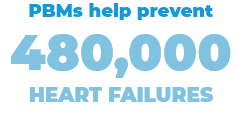Patient Care
Pharmacy benefit companies work to lower prescription drug costs, improve patient access to prescription drugs, and offer benefits that protect a patient’s overall health.
Health care plans hire pharmacy benefit companies, PBMs, to secure lower costs for prescription drugs, passing the savings directly to patients. PBMs are your first line of defense against rising prescription drug costs. They work to ensure lower costs and better health outcomes through affordable access to medicines you need.
PBMs and Patient Care Coordination
Pharmacy benefit companies serve a crucial role as the hub connecting multiple aspects of the health care system that serves patients. PBMs’ care management role begins well before prescribing.
Here's how it works:
On behalf of pharmacy benefit companies, independent clinicians carefully evaluate new drugs, review existing drugs, and apply sophisticated drug assessments that promote optimal use of complex medications and the appropriate use of mainstay drugs.
Pharmacy benefit companies harness data and provide platforms to connect patients, medical professionals, and payers. Real-time prescription benefit technology, used at the point-of-prescribing, informs prescribers and patients about a medication’s formulary placement and cost sharing. Prescribers can include doctors, physician assistants, and nurse practitioners.
Utilization management tools are embedded in this technology to help guide patients and their prescribers toward the safest, most cost-effective drugs, to help reduce waste and avoid negative drug interactions.
This real-time prescription benefit technology is linked to electronic prescribing, which enables the prescriber to send the prescription electronically to the pharmacy of the patient’s choice.
PBMs help reduce the hassle factor at the pharmacy counter for all stakeholders and ensure patients get the medications they need at the right time and the expected cost.
RESEARCH SHOWS US

Over the next 10 years, PBMs will help prevent 1 billion medication errors.

Through specialty pharmacy services, PBMs will help extend and improve the quality of life for patients with multiple sclerosis and rheumatoid arthritis by approximately 1 million quality-adjusted life years (QALYs) over 10 years.

PBMs improve drug therapy and patient adherence in diabetes patients, helping to prevent some 480,000 heart failures; 230,000 incidents of kidney disease; 180,000 strokes; and 8,000 amputations annually.

